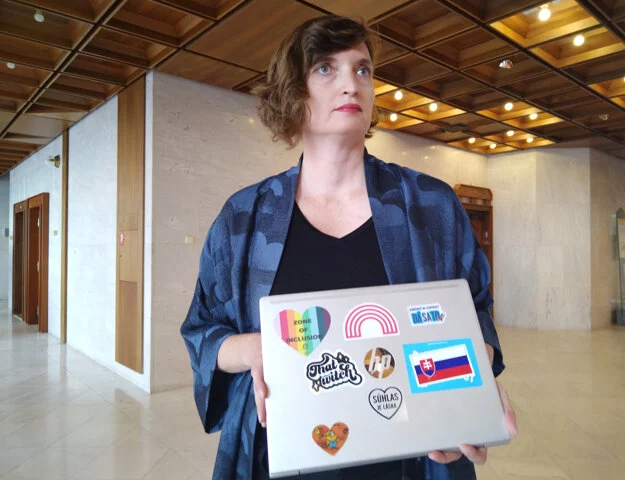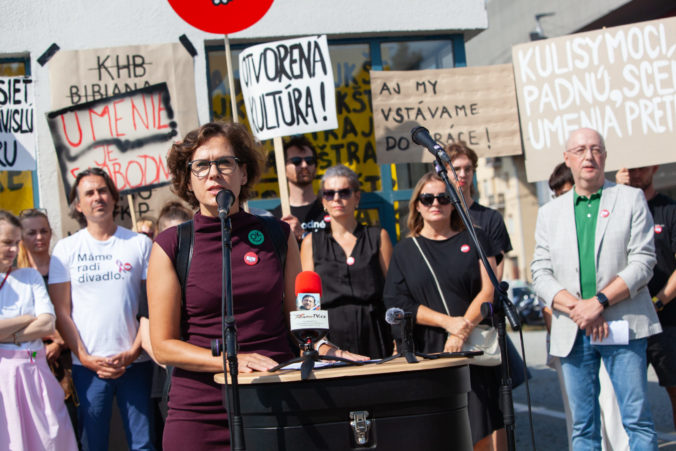Fico IV cover their failures with attacks on the opposition (Zeitgeist 7.)
Fico IV cabinet is pushing forward a financial consolidation plan based on raising taxes through a fast-track legislative process, avoiding public or parliamentary participation. This has caused controversy, especially among populist party supporters who were promised lower prices. The government has dismissed criticisms from the European Commission’s rule of law report and accused the Commission of bias.
The government aligned with the Judicial Council in criticizing the report, focusing on supposed media distortions rather than addressing concerns about the rule of law. Meanwhile, Culture Minister Martina Šimkovičová’s legal actions against critics like writer Michal Hvorecký reflect her hostility towards government dissenters, sparking cultural protests over declining working conditions. The government also targets opposition leadership; Michal Šimečka was removed as deputy speaker in a move seen as a diversion from more significant political issues. The coalition has further consolidated power by eliminating opposition members Michal Šipoš and Mária Kolíková from committee chair positions, citing unverified claims. These actions collectively indicate a tightening grip on power by the ruling coalition, undermining democratic norms and opposition roles in parliament.
Somewhere over the rainbow, a financial consolidation is happening
Some topics are unpopular among any group of voters. However, the financial consolidation based on a rise in taxes (for instance, the proposed increase of the VAT from 20% to 23%) is particularly unpopular among the voters of the populist parties, who declared that everything will be cheaper once they win the election. The ruling coalition uses several smoke screens to cover their consolidation plans. One of these strategies is to create chaos during the parliamentary discussion on the proposed policies, which will lead to the avoidance of the uncomfortable questions raised by the parliamentary opposition and journalists. Apparently insignificant issue of having a sticker on the laptop grew into several hours long debate on advertisement in the meeting room.
It all started during the September meeting of the Slovak National Council; Deputy Chairman Andrej Danko accused the opposition MP Lucia Plaváková of rainbow stickers on her laptop, which he claimed were an advertisement, and asked her to leave the session. Plaváková filed an objection to her removal, which was supported by 89 members of parliament, siding with her objection. Danko expressed dissatisfaction, stating the coalition agreement was violated since Hlas-SD members voted with the opposition. Outside the meeting room, the incident drew further controversy as SNS member Rudolf Huliak attacked MP Plaváková with derogatory language and called her a b****.
MP Huliak refused to apologize and even received support from his parliamentary club. For further context, MP Plaváková is open about her homosexuality, while MP Huliak and the SNS party are open about their far-right ideology, as they presented in the their latest bill proposal on “the ban of the untraditional sexual orientations and gender identities” in schools.

MP Lucia Plaváková and her notebook with stickers.
photo: TASR
Nationalists against the rainbow
Four MPs of SNS have introduced an anti-LGBTI+ bill aimed at schools, bypassing Education Minister Tomáš Drucker. The proposal resembles Polish and Hungarian law, which have faced legal actions by the European Commission. The proposed amendment seeks to define non-traditional sexual orientation, prohibit its promotion in schools, and impose fines for violations, claiming to protect children from influences that conflict with traditional values defined in the Slovak Constitution. Critics argue the bill exacerbates existing issues like LGBTI+ youth bullying, fails to address real problems in the education system, and distracts from the SNS’s troubles within their ministries.
The proposed law aims to ensure that the educational process in schools aligns with the cultural and ethical values of Slovak society, promoting responsible citizenship and protecting family integrity. It introduces a definition of „non-traditional sexual orientation“ as any orientation deviating from the traditional relationship between a man and a woman, reinforcing that marriage is a unique bond that must be protected by the state. The law also intends to prohibit any promotion or support of ideas related to non-traditional sexual orientations and gender identities within educational institutions to safeguard children against content considered inappropriate.
2,7 billion consolidation package is being adopted in the fast-track procedure
The fast-track legislative procedure became a popular tool for Fico IV. Once, an extraordinary measure intended for the time of crisis transitioned into a popular way to avoid any participation from the public or parliamentary discussion. Fico IV has passed in the first ten months of its term nearly 60% of laws through fast-track legislative proceedings without apparent justification. This significant increase in expedited laws indicates today’s coalition’s lack of respect for democratic lawmaking processes, prioritizing authoritarian decisions over quality expert debate. This time, the National Council was set to discuss a bill to improve public finances through a fast-tracked legislative process.
Prime Minister Robert Fico announced a fiscal consolidation plan for Slovakia, aiming to adjust public finances by €2.7 billion and reduce the deficit to 4.7% of GDP next year. Among the most disputed proposed amendments are introducing the VAT base rate increasing from 20% to 23% and a new 22% tax rate for corporations with taxable income over one million EUR. Another imposed tax on financial transactions, infamously introduced in Hungary, should bring another nearly 700 million euros into the budget. The government aims to balance fiscal targets with social measures, like introducing a thirteenth pension, while facing criticism from the opposition accusing it of inadequate cost-cutting measures and raising taxes.
Fico IV says: Everything is excellent; you don’t want to see it
The European Commission issued a report on the rule of law for each EU member state on July 24. Despite extensive consultations with government bodies, professional chambers, and civil organizations, the Fico IV government reacted negatively to its assessment. The government criticized the Commission for referring to media sources and claimed it lacked the opportunity to respond to report updates. However, Fico IV forgot the report is an independent evaluation by the Commission.
Fico’s government accused the Commission of favoring non-governmental over official sources without proper verification. The government dismissed criticism on issues like judicial independence and amendments to criminal laws, arguing the problems were inherited from previous administrations. The government downplayed the European Commission’s concerns about centralizing power and abolishing specific prosecutorial units, referencing Constitutional Court decisions. Moreover, the government challenged allegations of corruption and deteriorating conditions for civil society, asserting media influence and public discontent skew perceptions.
Despite the backlash, the report highlighted ongoing challenges with the rule of law under Fico’s administration. The response was marked by deflections of responsibility and accusations of media and public hostility towards the government. Fico IV’s response also dismissed concerns over legislative proposals affecting NGOs and citizenship rights, framing them as necessary measures against external influences.
The government and the Judicial Council are, unfortunately, on the same page
The Judicial Council also reviewed the European Commission’s Report on the State of the Rule of Law, echoing criticisms made by government officials. Coincidentally, the arguments of the Judicial Council very much overlap with the reaction of the Fico IV cabinet. They characterized the report as untrustworthy, subjective, and misleading, with claims of political bias. Chairwoman Marcela Kosová and members of the Council criticized the report as a political tool that ignored recent changes in Slovakia’s legal framework and was influenced by dissatisfaction with election outcomes.
Fico IV and the Judicial Council omitted to notice that the report’s creation involved comprehensive consultations over several months, involving 32 local entities and data from 22 international organizations. Government and Council members claimed liberal media distorted Slovakia’s image, heavily influencing the Commission’s report. Despite these criticisms, the European Commission referenced Judicial Council data ten times, more than any media source. Moreover, the Slovak government had the opportunity to provide counterarguments before the report’s publication, which could have influenced its final content.
Culture Minister Šimkovičová uses threats against the leaders of the cultural community
Culture Martina Šimkovičová has filed a criminal complaint against writer Michal Hvorecký for alleged defamation following his commentary in the newspaper. In his article, Hvorecký described the government as including two neo-fascists, referring to Šimkovičová and Environment Minister Tomáš Taraba. Hvorecký is also an advocate for public petitions, including one demanding Šimkovičová’s resignation, which garnered over 187,000 signatures. The petition emerged after the dismissal of leaders from the Slovak National Theatre and Slovak National Gallery. Šimkovičová, in a pro-Kremlin media segment, indicated plans to take legal action against critics. The criminal complaint she filed seeks legal penalties rather than financial compensation for defamation, which carries the potential for one to five years in prison under Slovak law. This frivolous lawsuit fulfills the qualities of a SLAPP (strategic lawsuit against public participation), which mainly threatens the defendants and consumes their finances and time for a defense.
In the meantime, a Platform Otvorená kultúra (Open culture) started a cultural strike, a coordinated movement of the artistic scene in Slovakia, the goal of which is to stop the devastating interventions of the leadership of the Slovak Ministry of Culture in culture at all its levels. Almost 400 cultural organizations signed for the strike emergency because the working conditions of the workers in our resort have radically deteriorated. Many institutions faced layoffs, intimidation, threats, and workplace bullying. The department’s management threatens individuals who refuse to submit to their preferred ideological perspective, and uncontrolled legislative changes paralyze the functioning of public funds.

Open Culture! and representatives of the cultural community have launched a cultural strike.
photo: SITA/Tomáš Bokor
Slovak Arts Council intentionally disabled
Culture Minister Martina Šimkovičová has dismissed Ján Hrkút from the Slovak Arts Council (Fond na podporu umenia, FPÚ), despite him being one of her own nominees. Hrkút was the only newly appointed member who actively participated in the council meetings, as the recent composition has been unable to reach quorum due to the inattendance of new members appointed by the ministry. He stated that attempts were made to instruct him not to attend, claiming he received messages from a Ministry official that he ignored, as he believed in the Council’s independence. Although he has not been officially informed of the reasons for his dismissal, the Ministry claims it followed the law governing the FPÚ. Following Hrkút’s removal, a new member, Iveta Babjaková, has been appointed to the Council, who voluntarily stepped down after her first Council meeting.
The Council has faced disruptions, with recent meetings failing to achieve quorum, which has delayed grant applications for the upcoming year. The Culture Minister appoints seven members unilaterally, but so far only six appointments have been made. The Council supports fifteen areas of art and culture, including music, literature, museums, galleries, and cultural centers. In 2023, the fund had over 20 million EUR available for redistribution, while the requested amount exceeded €65,200,000. Current FPU budget for the restoration, modernization, and construction of local and regional cultural infrastructure and folk culture, was raised to €30 million EUR.
The ruling coalition leading frontal attack against parliamentary opposition
For over a month, Robert Fico threatened Michal Šimečka, leader of the strongest opposition party, Progressive Slovakia, with dismissal from the seat of the deputy speaker of the parliament. It is a constitutional tradition that this seat belongs to the representative of the opposition. Critics see Fico’s narrative as distracting from controversies like the suspension of Kováčik’s punishment, ongoing protests against Culture Minister Martina Šimkovičová, and a controversial bill on consolidation package. Šimečka was finally dismissed by the parliamentary majority following a secret vote where 76 out of 150 MPs supported his removal. This decision marks a break from the tradition of having one deputy speaker from the opposition. The motion to remove Šimečka was led by Smer and the far-right SNS, citing unproven allegations of subsidy misuse linked to him and his family.
Šimečka and Progressive Slovakia have denied these claims and countered by revealing state funding links to coalition MPs. In his response, Šimečka vowed to strengthen his opposition efforts, criticizing the move as retaliation from Robert Fico’s coalition. The parliamentary leadership faces uncertainty, with no permanent speaker and opposition parties unwilling to nominate a successor for Šimečka. The ruling coalition also dismissed opposition MPs Michal Šipoš and Mária Kolíková from their committee chair positions. Coalition MPs initiated the proposals. Šipoš was accused of abusing his role to obstruct committee functions. At the same time, Kolíková allegedly acted beyond her powers by engaging with the General Prosecutor without prior committee approval and canceling meetings without justification.
About Zeitgeist
Zeitgeist is the English newsletter of VIA IURIS, in which we try to capture the zeitgeist of the political situation in Slovakia, which has changed dramatically after the parliamentary elections in September 2023.
The 4th government of Prime Minister Robert Fico was formed by a coalition of two, as they call themselves, social democratic parties – SMER-SD, HLAS-SD and the nationalist party SNS. Since the coalition was formed, institutions guaranteeing the rule of law and public control, including Slovak civil society, have been under constant attack.
Previous issues of our English newsletter can be found here
Topics: #RuleOfLaw #legislation #media #CivilSociety

